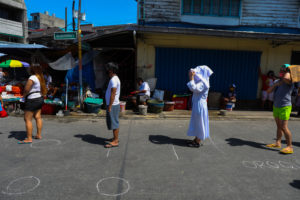BAGUIO CITY—A P200-million stimulus fund is being raised for Baguio businesses, particularly those oriented toward tourism, to allow them to recover in two to three years, Mayor Benjamin Magalong said on Tuesday.
But Magalong, who said the fund was insufficient, was urged instead to put up Baguio treasury bonds to keep economic projects afloat until microenterprises and small and big businesses stabilized.
“We usually borrow or rely on taxes but hardly in the Philippines have local governments raised their own money using government bonds. We borrow money from residents [which they can redeem at a certain period],” said Gladys Navarro, an economics professor at Saint Louis University (SLU) here.
Transition plan
Navarro and government economists joined a management committee meeting that would formulate a transition plan once Baguio was placed under a general community quarantine that would allow more businesses to operate.
“Baguio people will also have some sort of ownership for something the city builds,” said Navarro, who is also manager of a business program jointly undertaken by SLU and the Department of Science and Technology.
Magalong invited them to provide insights into how alternative industries could thrive, given the impact of restricted public movement on businesses like restaurants and hotels.
Even after quarantine rules are relaxed, the city government will remain wary of visitors from areas where the new coronavirus disease (COVID-19) has spread unless a cure is found or until enough mass testing has been undertaken to show an accurate map of contamination, he said.
He also said both national and local governments were quickly running out of money used to subsidize various sectors during the lockdown.
Allowances to jeepney drivers
Baguio, for example, bought food for quarantined households and medical equipment for detecting the coronavirus, and gave allowances to jeepney drivers for ferrying people on market days.
Magalong said the stimulus package must be in the form of loans “so the city government can reuse the money to help other businesses.”
More than 4,000 of the city’s 20,000 registered businesses are engaged in real estate and have suffered losses due to the quarantine, according to budget officer Leticia Clemente.
She said about 4,000 “sari-sari” (variety) stores or about 20 percent of businesses had been the most profitable during the lockdown. Many of these stores have expanded to include vegetables for residents who have not been allowed to go out of their homes.
But Baguio must first study the buying patterns of residents so it could encourage investors to engage in projects that would serve a bigger population, economists said. —VINCENT CABREZA


